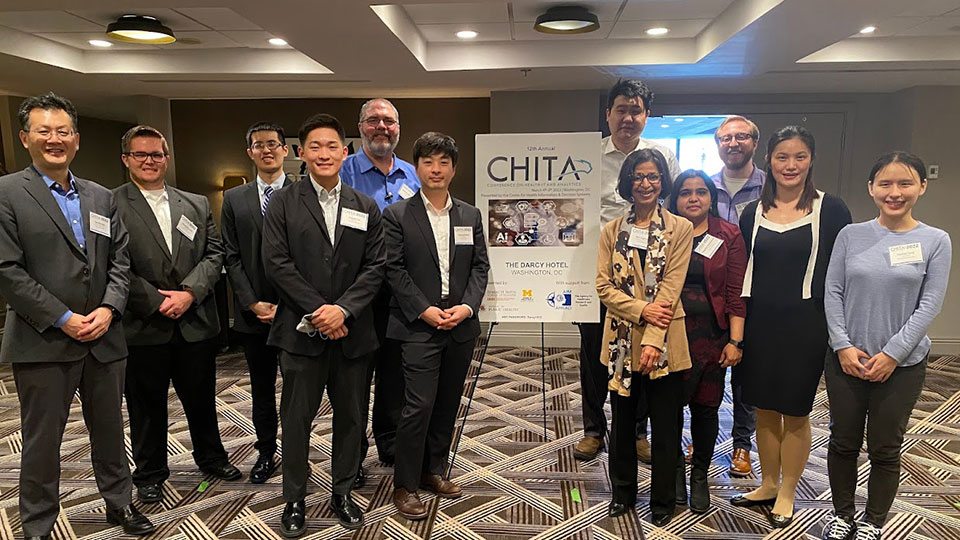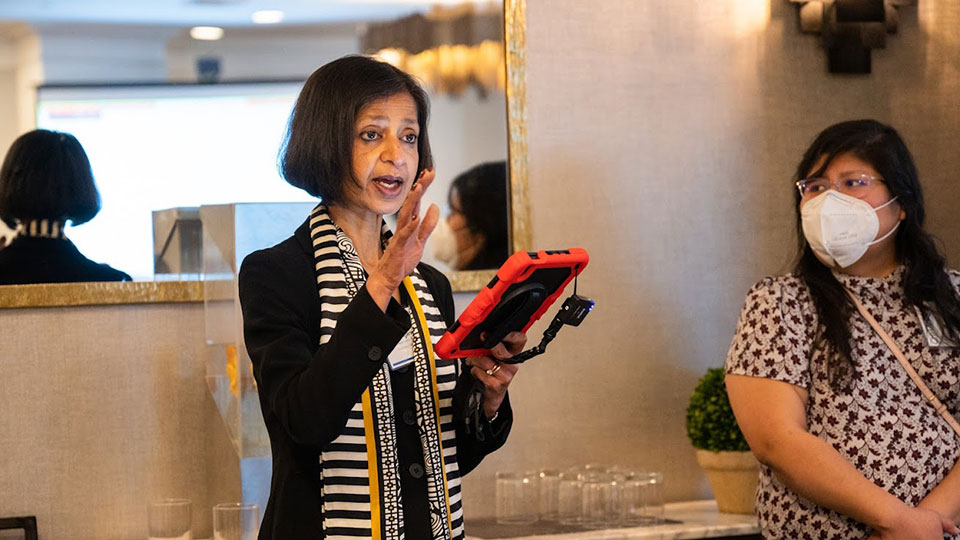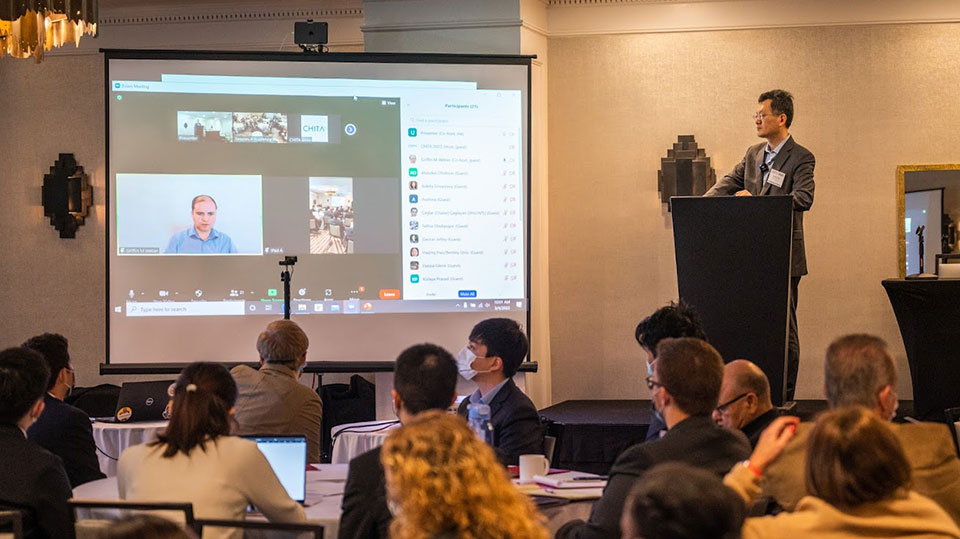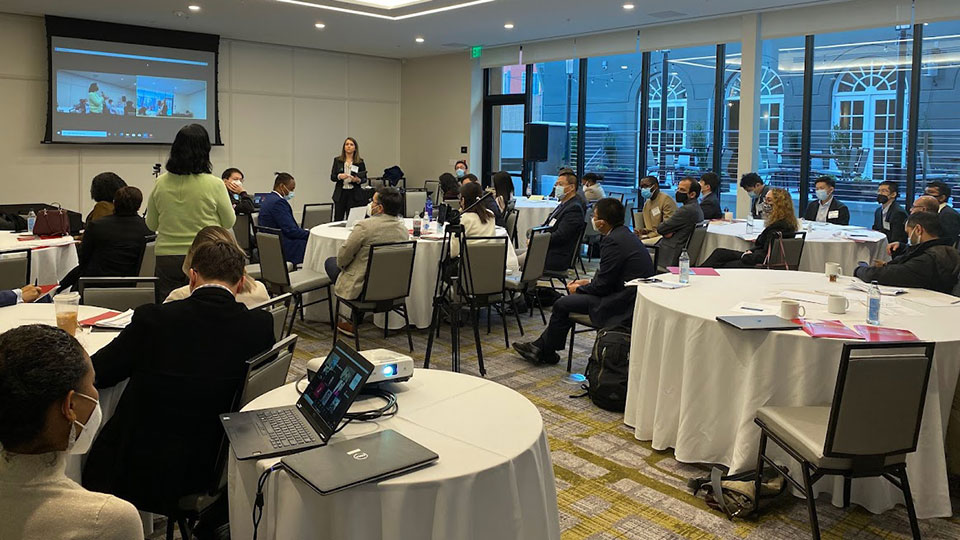
Healthcare is in the midst of an AI-driven transformation, but much work remains to realize AI’s potential in real-world settings while minimizing undesirable outcomes. From March 4–5, 2022, more than 100 researchers attended the 12th annual Conference on Health IT and Analytics (CHITA) in Washington, D.C., hosted by the Center for Health Information and Decision Systems (CHIDS) at the University of Maryland’s Robert H. Smith School of Business.
AI and its intersection with health disparities and bias were central themes, along with discussions of other technologies revolutionizing healthcare delivery.
Ritu Agarwal, distinguished university professor, Robert H. Smith dean’s chair of information systems and co-director of CHIDS, said in her opening remarks: “…we are all bound by our collective passion for improving healthcare. Today, the ongoing global pandemic and the opportunities that digital technologies, analytics and AI offer make the work we do more important than ever.”
Leading researchers and practitioners offered their insights during keynote addresses.
“A lot of research has been conducted in AI, and a lot of papers have been published, but the translation to products and real-life change has been much slower,” said Dr. Lily Peng, MD, PhD, director of program management at Google Health. “It takes more than data and models to make AI impact clinical practice.” She used Google’s experience in Thailand and India to illustrate that a “human-centered approach is key to building useful products.”
Joining Peng was Dr. Griffin Weber, MD, PhD, associate professor of medicine at Beth Israel Deaconess Medical Center and Harvard Medical School. “Data from various sources need to be linked to create a complete picture of a patient,” Weber said during his keynote. He discussed how a federated model can enable data sharing across institutions.
Julia Adler-Milstein from UCSF shared her latest research on using big data in electronic health records to understand physician behavior and improve clinical decision-making.
Multiple sessions at CHITA examined biases that may arise from AI use and exacerbate disparities, undermining health equity. “It is critically important to ensure that AI does not introduce new biases,” said Agarwal, the conference chair. “When we rush to apply AI, let’s remember the ‘do no harm’ principle from the Hippocratic Oath.”
In a panel on AI and disparities moderated by Gordon Gao, professor and co-director of CHIDS, panelists from practice, policy and business perspectives discussed mitigation strategies. “We should benchmark AI with human workers,” Gao said, “to examine whether AI has reduced systematic biases.” Panelists included Roland Thorpe, MD, of Hopkins; Jessica Galarraga, MD, from MedStar; and Cupid Chan from Pistevo Decision.
Telemedicine also surfaced as a key issue. In a session moderated by co-chair Jeff McCullough of the University of Michigan, Clarity Inc. senior vice president Anton Arbatov said, “It’s about coverage and payment at the federal and state levels. We must continue to work with programs like Medicaid and Medicare to ensure services are covered. This can be a tedious, lengthy process, because payers typically require data to make decisions.” He added that Medicare telehealth policy hadn’t evolved for decades “largely because there was no data to prove telehealth was cost-effective.” “We’re getting that data now. And we need to continue to push legislators and decision-makers to endorse coverage as new technology rolls out. It’s an ongoing battle.”
Former FDA senior technology advisor Anajali Kataria added, “We’re seeing convergence — home becoming the epicenter of care instead of the hospital or clinic.”
“So, the doctor ‘on telemed’ will be assisting the patient and caregiver at home,” said Kataria, now CEO and co-founder of Mytonomy. “We’ll see imaging—like MRI—that’s portable and arrives via Uber to your house… We’re within just years of having our own living-room docking station for home health diagnostics. COVID already demonstrated that mass lab testing—taking your own swab—is possible at home.”
“Healthcare is ripe for disruption,” said industry keynote speaker Sam Hanna. Highlighting data from connected health tools, remote-patient monitoring, wearables, and increased virtual doctor visits driven by COVID, he added: “The industry has had a reputation for being laggard when it comes to technology. But we’re now at a critical point because we have so much actionable, consumer-generated data toward improving the patient experience… We now have a way to leapfrog and do some very cool and important things that help us all.”
With support from NIH’s AIM-AHEAD program, CHITA offered travel grants to 15 attendees, most of whom were underrepresented minorities. “I see the tremendous value of AI in improving healthcare, and am eager to explore even more,” said grant recipient Dr. Abiodun Otolorin, MD, family medicine specialist and assistant professor at Howard University.
AIM-AHEAD was represented at CHITA by Legand Burge, PhD, who is leading the program’s Data Science Training Core, and Lavanya Vishwanatha, program manager.
Paper sessions and research panel discussions included themes such as:
- AI augmentation and applications in healthcare
- Big data in healthcare
- COVID
- Disparities, equity and fairness
- Electronic health records
- Health IT impact
- Healthcare biases and disparities
- Innovations in care delivery
- Optimizing resource allocation in healthcare
- Patient wellness
- Physician behavior
- Privacy
- Service organizations in healthcare
CHITA organizers also presented research awards:
- Best Student-Authored Paper – “Convenience vs. Confidentiality: Rethinking the Role of Online Purchases at the Era of Rising Privacy Concerns” by Huiqi Zhuang, Ruli Xiao, Jian Ni and Yajing Jiang
- Best Paper Award – “Effects of Real-time Prescription Benefits” by Sunita Desai, Jiejie Wang, Alan Chen, Wei-Yi Chung, Jay Stadelman, Chris Mahoney, Adam Szerencsy, Lisa Anzisi, Ateev Mehrotra and Leora Horwitz
- Young Researcher Award – Sriram Somanchi of University of Notre Dame’s Mendoza College of Business for work at the intersection of machine learning and social science
- Health IT in Action Award (new) – “Judgmental Bot: Conversational AI in Online Mental Health Screening” by Ryan Raimi, Antino Kim, Sezgin Ayabakan and Alan Dennis
CHITA is produced annually in partnership with the University of Michigan School of Public Health, the University of Maryland School of Public Health and is supported in part by the Agency for Healthcare Research and Quality. CHITA 2022 also received support from a Title VI CIBE grant administered by the U.S. Department of Education.
Media Contact
Greg Muraski
Media Relations Manager
301-405-5283
301-892-0973 Mobile
gmuraski@umd.edu
About the University of Maryland's Robert H. Smith School of Business
The Robert H. Smith School of Business is an internationally recognized leader in management education and research. One of 12 colleges and schools at the University of Maryland, College Park, the Smith School offers undergraduate, full-time and flex MBA, executive MBA, online MBA, business master’s, PhD and executive education programs, as well as outreach services to the corporate community. The school offers its degree, custom and certification programs in learning locations in North America and Asia.


